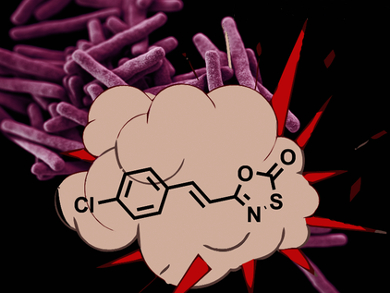Despite being one of the most prominent and well-characterized infectious diseases, tuberculosis (TB) is still considered a global health concern. This is especially true with increased resistance of Mycobacterium tuberculosis (Mtb) to existing drugs, calling for new TB therapies.
Mats Larhed and colleagues, Uppsala University, Sweden, synthesized and tested 5-styryl-oxathiazol-2-ones (pictured) as inhibitors of the Mtb proteasome. Proteasomes are protein-degradation complexes important for Mtb survival, and thus are an excellent drug target. The compounds selectively inhibited Mtb proteasomes, and were particularly effective towards nonreplicating Mtb. This is important since nonreplicating Mtb are typically unaffected by most drugs, leading to the prolonged treatment of TB.
Overall, this new class of inhibitors can be useful in developing antitubercular drugs that are especially effective against nonreplicative bacteria, thus supplementing current treatments.
- Optimization and Evaluation of 5-Styryl-Oxathiazol-2-one Mycobacterium tuberculosis Proteasome Inhibitors as Potential Antitubercular Agents,
Francesco Russo, Johan Gising, Linda Åkerbladh, Annette K. Roos, Agata Naworyta, Sherry L. Mowbray, Anders Sokolowski, Ian Henderson, Torey Alling, Mai A. Bailey, Megan Files, Tanya Parish, Anders Karlén, Mats Larhed,
ChemistryOpen 2015, 4, 342–362.
DOI: 10.1002/open.201500001




